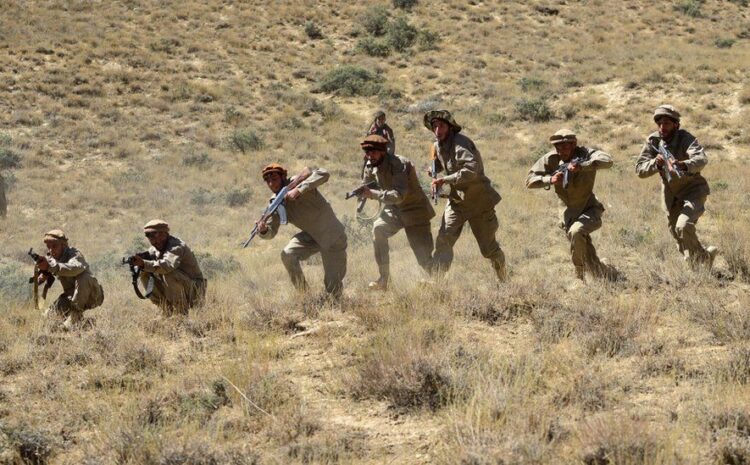
IMAGE SOURCE GETTY IMAGES image caption Thousands are reported to be taking part in the fighting in Panjshir
Taliban sources told Reuters news agency that they had seized the area, but the resistance fighters they are battling denied this.
One of the resistance leaders, Amrullah Saleh, dismissed claims he had fled, but said the situation was “difficult”.
The fighting in Panjshir is reported to have left hundreds dead.
The valley, north of the capital Kabul, is one of Afghanistan’s smallest provinces and the only one not to have fallen to the Taliban.
The traditional anti-Taliban stronghold is home to somewhere between 150,000 and 200,000 people, and is hidden behind mountain peaks.
In a video message sent to the BBC, Mr Saleh, a former vice-president of Afghanistan, said there had been casualties on both sides.
But he added: “We will not surrender, we are standing for Afghanistan.”
He said he was sharing the video to assure people that reports suggesting that he had left the country were false. However the BBC was unable to independently confirm his location.
Ali Nazari, a spokesperson for the National Resistance Front (NRF) fighters, told BBC World News that the rebels had pushed the Taliban on the back foot.
But Taliban officials have been claiming victory in the area, with one commander telling Reuters news agency: “By the grace of Allah Almighty, we are in control of the entire Afghanistan. The troublemakers have been defeated and Panjshir is now under our command.”
- ANALYSIS: What rise of Taliban means for Pakistan
- BACKGROUND: The story of Afghanistan’s ‘undefeated’ valley
- ON THE GROUND: In Kabul, Afghans adjust to a new, uncertain fate
- VOICES: Kabul make-up artist: ‘Women like me are targets’
The Taliban are now in control of the rest of the country, and are expected to announce a new government in the coming days.
The European Union and UK on Friday joined the US in saying they will deal with the Islamist group, but won’t recognise them as Afghanistan’s government.
The EU also said it was planning to re-establish a diplomatic presence in Kabul to oversee evacuations and ensure that a new Afghan government fulfils commitments on issues including security and human rights.
But its foreign affairs chief Josep Borrell said any engagement would be subject to strict conditions and would only be to support the Afghan people.
If the West does not want to deal with them, there are other powers such as China, Russia and Pakistan they can turn to, our correspondent adds.
